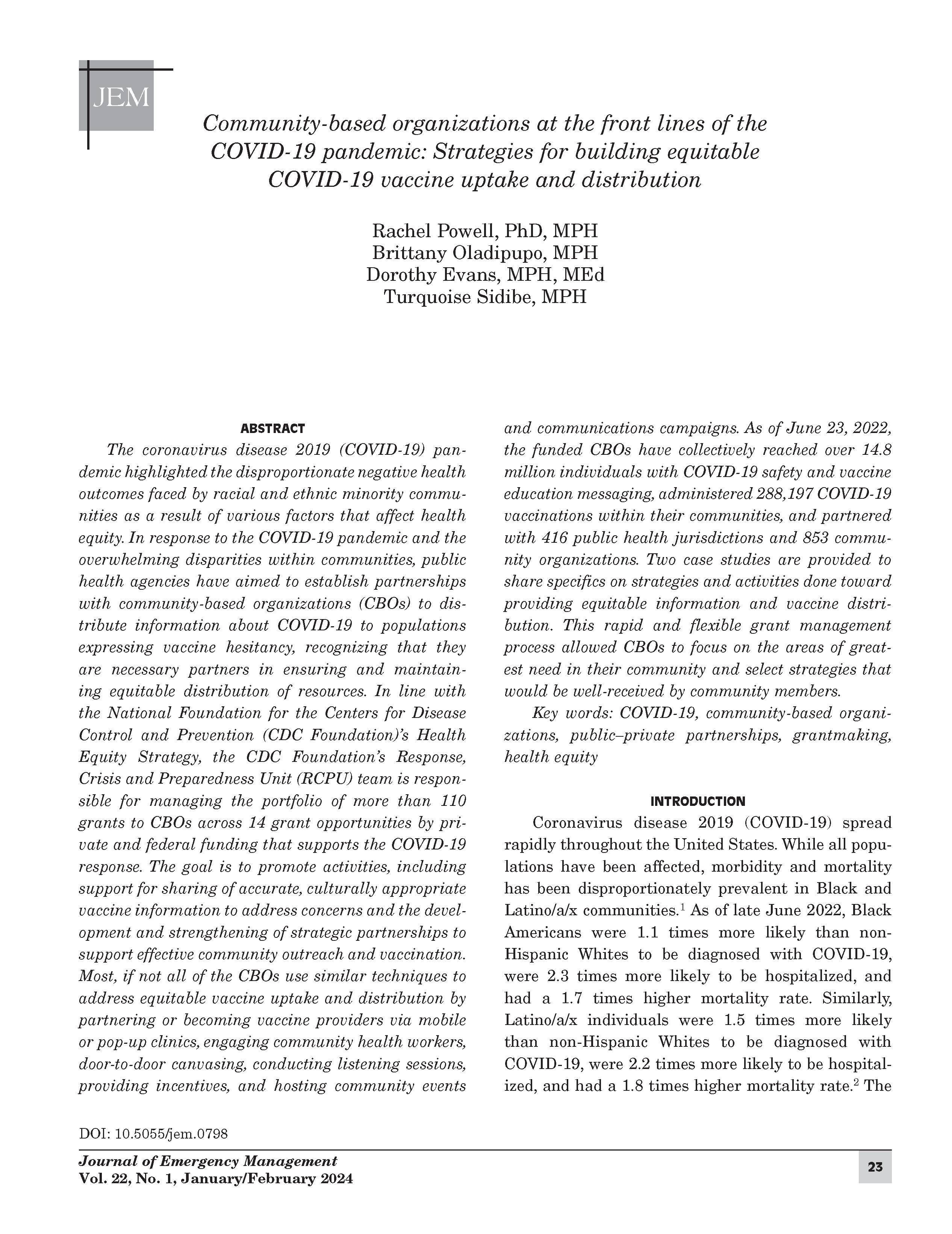Community-based organizations at the front lines of the COVID-19 pandemic: Strategies for building equitable COVID-19 vaccine uptake and distribution
DOI:
https://doi.org/10.5055/jem.0798Keywords:
COVID-19, community-based organizations, public–private partnerships, grantmaking, health equityAbstract
The coronavirus disease 2019 (COVID-19) pandemic highlighted the disproportionate negative health outcomes faced by racial and ethnic minority communities as a result of various factors that affect health equity. In response to the COVID-19 pandemic and the overwhelming disparities within communities, public health agencies have aimed to establish partnerships with community-based organizations (CBOs) to distribute information about COVID-19 to populations expressing vaccine hesitancy, recognizing that they are necessary partners in ensuring and maintaining equitable distribution of resources. In line with the National Foundation for the Centers for Disease Control and Prevention (CDC Foundation)’s Health Equity Strategy, the CDC Foundation’s Response, Crisis and Preparedness Unit (RCPU) team is responsible for managing the portfolio of more than 110 grants to CBOs across 14 grant opportunities by private and federal funding that supports the COVID-19 response. The goal is to promote activities, including support for sharing of accurate, culturally appropriate vaccine information to address concerns and the development and strengthening of strategic partnerships to support effective community outreach and vaccination. Most, if not all of the CBOs use similar techniques to address equitable vaccine uptake and distribution by partnering or becoming vaccine providers via mobile or pop-up clinics, engaging community health workers, door-to-door canvasing, conducting listening sessions, providing incentives, and hosting community events and communications campaigns. As of June 23, 2022, the funded CBOs have collectively reached over 14.8 million individuals with COVID-19 safety and vaccine education messaging, administered 288,197 COVID-19 vaccinations within their communities, and partnered with 416 public health jurisdictions and 853 community organizations. Two case studies are provided to share specifics on strategies and activities done toward providing equitable information and vaccine distribution. This rapid and flexible grant management process allowed CBOs to focus on the areas of greatest need in their community and select strategies that would be well-received by community members.
References
Stokes EK, Zambrano LD, Anderson KN, et al.: Coronavirus disease 2019 case surveillance—United States, January 22–May 30, 2020. MMWR Morb Mortal Wkly Rep. 2020; 69(24): 759-765. DOI: 10.15585/mmwr.mm6924e2.
Centers for Disease Control and Prevention: COVID-19 racial and ethnic health disparities. 2022. Available at https://www.cdc.gov/coronavirus/2019-ncov/community/health-equity/racial-ethnicdisparities/index.html. Accessed August 13, 2022.
Killerby ME, Link-Gelles R, Haight SC, et al.: Characteristics associated with hospitalization among patients with COVID-19—Metropolitan Atlanta, Georgia, March–April 2020. MMWR Morb Mortal Wkly Rep. 2020; 69(25): 790-794. DOI: 10.15585/mmwr.mm6925e1.
Lopez L, Hart LH, Katz MH: Racial and ethnic health disparities related to COVID-19. JAMA. 2021; 325(8): 719. DOI: 10.1001/jama.2020.26443.
Centers for Disease Control and Prevention: Risk for COVID-19 infection, hospitalization, and death by race/ethnicity. 2020. Available at https://www.cdc.gov/coronavirus/2019-ncov/covid-data/investigations-discovery/hospitalization-death-by-race-ethnicity.html. Accessed August 17, 2022.
Presidential COVID-19 Health Equity Task Force: Presidential COVID-19 health equity task force: Final report and recommendations. 2021. Available at https://www.minorityhealth.hhs.gov/assets/pdf/HETF_Report_508_102821_9am_508Team%20WIP11-compressed.pdf. Accessed September 4, 2022.
Ojikutu BO, Bogart LM, Dong L: Mistrust, empowerment, and structural change: Lessons we should be learning from COVID-19. Am J Public Health. 2022; 112(3): 401-404. DOI: 10.2105/ajph.2021.306604.
CDC Foundation: Our work on health equity. Available at https://www.cdcfoundation.org/HealthEquity. Accessed August 18, 2022.
Long Beach Post News: 63% of eligible long beach residents have gotten a vaccine, but low-income area lag far behind. 2021. Available at https://lbpost.com/news/long-beach-vaccination-ratescovid19-vaccine. Accessed September 17, 2022.

Published
How to Cite
Issue
Section
License
Copyright 2007-2025, Weston Medical Publishing, LLC and Journal of Emergency Management. All Rights Reserved.





